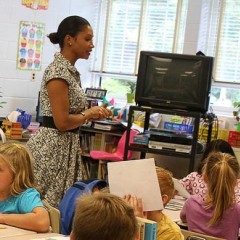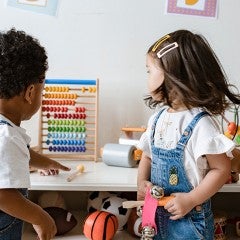Erin Baumgartner is the director of the Kinder Institute's Houston Education Research Center.
As any elementary school teacher can attest, there’s a substantial difference between the best strategies for how to teach a prekindergartner and a sixth-grader. Because they are at such different places in their cognitive, social and emotional development, they have different needs around building routines, understanding how to be a student and the types of environments that best foster learning.
To meet the needs of the youngest students requires that educators have a deep understanding of these developmental differences. But our research at the Kinder Institute’s Houston Education Research Consortium shows few pre-K teachers in the Houston area have received specific training in early childhood education. This training could look like a bachelor’s degree in early childhood education or a state certification reflecting specialized knowledge in educating the youngest students.
A relatively new opportunity in Texas, the Early Childhood: Prekindergarten - Grade 3 certification, commonly known as “EC-3,” may be a way to change this.
In Texas, most elementary teachers receive an “EC-6” certification — which means early childhood through sixth grade — and very few earn an early childhood education degree. For some teachers, learning how to instruct students ranging from 3 to 13 years old may leave them little opportunity to gain the depth of knowledge needed in the early childhood development space.
Offered starting in 2021, the EC-3 certification provides teachers with dedicated training in developmentally appropriate strategies for helping children from birth through age 8 grow physically, emotionally, socially and academically. To receive this certification, prospective teachers must demonstrate knowledge of child development, with nearly one-fifth of their certification exam testing them in this area. (The EC-6 exam doesn’t assess it.)
As a wide body of research shows, high-quality early childhood education plays an important role in preparing students for the future. And a high-quality early childhood education starts with having a teacher who’s trained for it and understands the developmental needs of our youngest students. This specialized training is so important that the National Institute for Early Education Research at Rutgers University includes it as a benchmark to achieve a high-quality public pre-K program.
To date, there have been few opportunities for classroom teachers to receive that type of training in the Houston area.
The University of Houston-Clear Lake offers an early childhood education bachelor’s degree, as well as a pathway to EC-3 certification for teachers already certified in another area. Sam Houston State University and Texas A&M University, albeit a bit farther away, also provide bachelor’s degrees in education with a focus on early childhood.
Fortunately, the list of Houston-area colleges and universities taking on EC-3 certification is growing.
Starting in January 2026, Rice University’s Glasscock School of Continuing Studies will be offering a pathway to the EC-3 certification through its alternative certification program. Lone Star College also plans to add a bachelor’s degree in early childhood education and teaching in the fall of 2026.
Ultimately, it takes more than a teacher with valuable early childhood education training to lead a classroom. It also requires campus leaders to recognize the value that the earliest years of school play in preparing their students for later grades — and respond by identifying ways to align instruction across grade levels and evaluate teachers using early childhood-specific tools.
Recently, a Texas school district leader told me how campus administrators had a “light bulb moment” during a workshop on what a high-quality pre-K classroom should look like. They realized the ways in which instruction and content delivery should be different for 4-year-olds and older students. This recognition can give teachers the space to support these young students who are still learning how to be students.
For children arriving in public school for the first time, these are major, life-changing adjustments. If the teachers in their first classrooms aren’t trained and supported in helping them build those skills, when will they learn?




